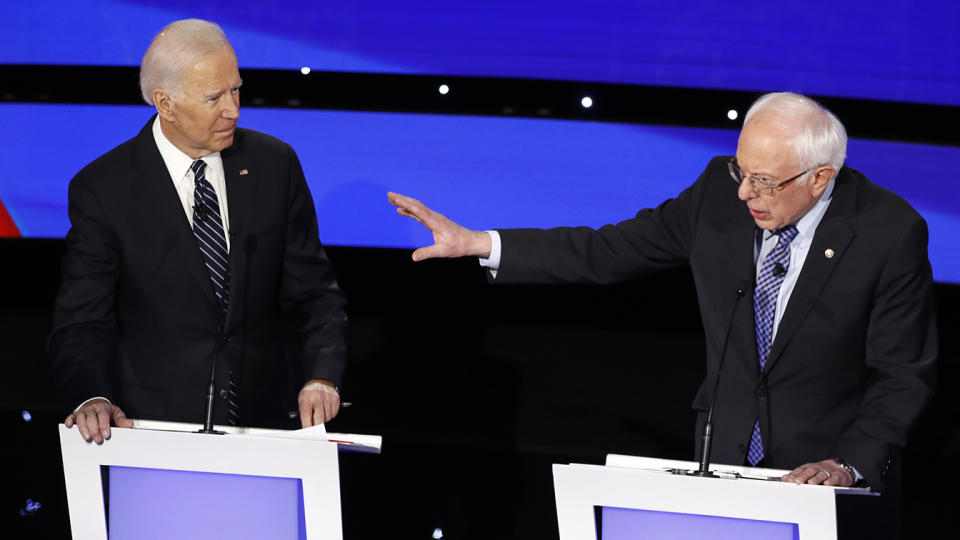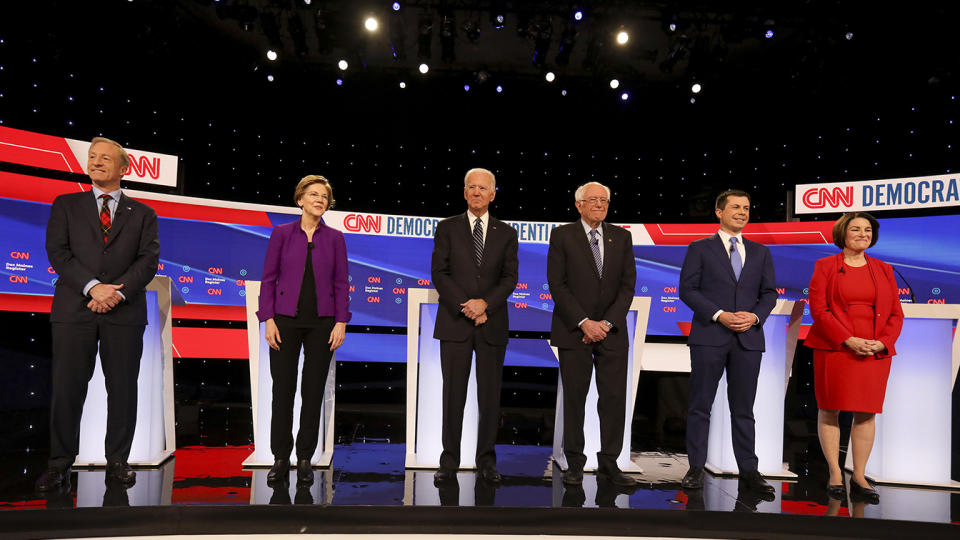3 key takeaways from the first Democratic debate of 2020
Democratic primary candidates gathered in Des Moines, Iowa, for their seventh debate of the 2020 cycle and first of the new year, the last time they will share a stage before actual voting begins with next month’s Iowa caucuses. There were few fireworks during the evening, with the first hour dedicated mostly to the Middle East and trade deals before the second half segued to discussions of health care and college tuition. Former Vice President Joe Biden avoided any serious missteps and got through mostly unscathed, while Sens. Bernie Sanders and Elizabeth Warren briefly clashed over what Sanders might have said to her over dinner in 2018.
Here are three takeaways from Tuesday night’s debate:

Foreign policy dominates first quarter
U.S. military policy, mostly absent from the Democratic debates so far, were on the minds of the moderators — and candidates — to start the night night at Drake University.
Six candidates vying for the the party’s 2020 nomination spent the first quarter of the debate defending their positions on foreign policy and explaining to Iowa caucus-goers why they are best qualified to be the next commander in chief.
Above all, though, they sought to differentiate themselves from President Trump.
Sanders and Biden both attacked President Trump over his decision to authorize the U.S. drone strike that killed Iranian Gen. Qassem Soleimani. Biden said that Trump “flat-out lied” when he suggested Soleimani was planning to attack four U.S. embassies. Sanders compared it to the events that led to the wars in Vietnam and Iraq.
“Both of those wars were based on lies,” Sanders said. “Right now, what I fear very much, is we have a president who is lying again and could drag us into a war that is even worse.”
South Bend, Ind., Mayor Pete Buttigieg criticized Trump, who vowed to end “endless wars,” over his decision to send 3,000 more troops to the Middle East in the wake of Soleimani’s killing. And Buttigieg, a U.S. Navy Reserve veteran who served in Afghanistan, put it in starkly personal terms.
“Whenever I see that happen, I think about the day we shipped out and the time that was set aside to say goodbye to family members,” Buttigieg said. “I remember walking with a friend of mine, another lieutenant I trained with, as we walked away and his 1½-year-old boy was toddling after him, not understanding why his father wasn’t turning back to scoop him up. And it took all the strength he had not to turn around and look at his boy one more time.”
Handshake: REJECTED pic.twitter.com/LUA49Z0JCc
— Timothy Burke (@bubbaprog) January 15, 2020
Sanders and Warren shake up the race
There has been speculation for months that the nonaggression pact between Sanders and Warren, who are competing for the same voters, would break down at some point. Tension between the campaigns picked up leading into Tuesday night, as CNN reported on a conversation between the two in late 2018 in which Sanders allegedly told Warren that he didn’t believe a woman could win the presidency.
“Well, for a matter of fact I didn’t say it,” said Sanders when questioned about the comments, and made it clear that he doesn’t believe that. “Let me be very clear: If any of the women on stage or any of the men win the nomination [...] I will do everything in my power to make sure they are elected.”
Warren was asked how she reacted to the reported remark.
“I disagreed,” she said. “Bernie is my friend and I’m not here to try to fight with Bernie. But look, this question of whether or not a woman can be president has been raised and it’s time for us to attack it head on,” replied Warren.
“So, can a woman beat Donald Trump? Look at the men on this stage. Collectively they have lost 10 elections. The only people on this stage who have won every single election that they’ve been in are the women: Amy and me.”
With the conversation about women being able to win seemingly behind them, an awkward exchange ensued immediately after the debate as Warren approached Sanders, who reached toward her for a handshake. Warren appeared to rebuff the gesture, and after a few moments she turned and walked off while Sanders was still talking.

A dwindling field and respectful tone
With just six candidates on stage, it was the smallest field of any debate thus far. It was also the first debate without a candidate of color, after Sen. Cory Booker of New Jersey, Rep. Tulsi Gabbard of Hawaii and entrepreneur Andrew Yang failed to qualify. (Booker dropped out of the race Monday, while Gabbard and Yang are still running.) Despite the smaller field, candidates were not given a chance to answer at length, with the moderators repeatedly cutting them off.
The atmosphere, apart from the Warren-Sanders contretemps, was mostly cordial, with candidates pushing policy differences and avoiding personal attacks. Sanders drew laughter from the room when he said, “Joe and I have a fundamental disagreement here, in case you haven’t noticed,” when contrasting his positions on trade with Biden’s, but the former vice president, who as the leader in most national polls was expected to be the focus of attacks from his rivals, was mostly unscathed. Although Sanders did bring up Biden’s support for the 2003 invasion of Iraq, Warren again declined to hit him on a bankruptcy bill that Biden supported and she fought against prior to her time in the Senate.
The next debate is set for Feb. 7, falling between the Iowa caucuses and New Hampshire voters heading to the primary polls. Previous debates have failed to move the polls much, but that may change as more voters tune in ahead of the actual voting.
_____
Read more from Yahoo News:
Democratic candidates debate who should be next commander in chief
'I didn't say it': Sanders denies saying a woman couldn't win the presidency
Here’s how Warren can still beat Bernie — and prove a woman can win
Trump impeachment trial set to throw Democratic primary into disarray
How race hurt Cory Booker — and the rest of 2020’s historically diverse field

 Yahoo Sports
Yahoo Sports 

